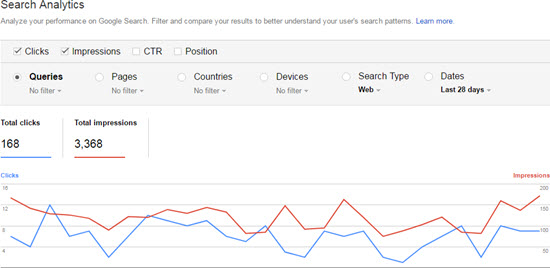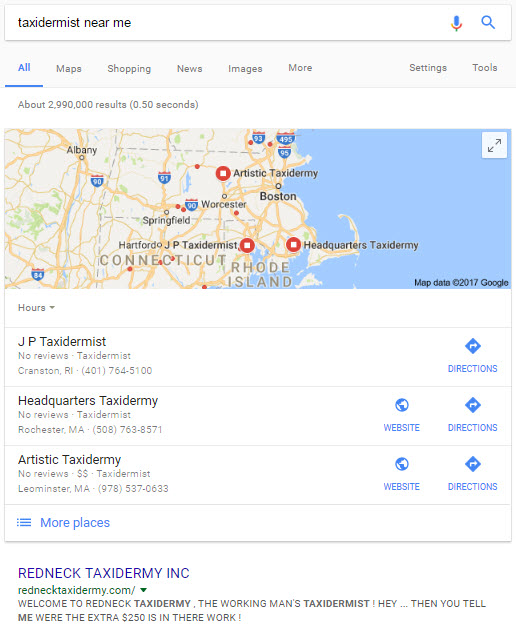You wanted a fresh look at your local rankings, but now you need fresh pants.
It’s bad.
Or maybe it’s not – at least not the rankings. Of course, it’s possible somebody involved in your SEO/visibility effort messed up, or that many people joined in a carnival of errors, or that Google got bored.
But it’s also likely you haven’t taken an accurate look at your rankings, and are still OK. It’s possible your rank-tracker goofed (despite their merits, they often do), or that you’re searching in Google in a way that skews results.
So before you let out a Klingon death scream, check a few more things. Use this checklist to confirm whether your rankings did in fact take a hit:
Did you:
- Look beyond your rank-tracker? As in, actually search in Google. Maybe look in another rank-tracker, too. (Or in Ahrefs, if you use that.)
- Sign out of your Google account? Personalized search history works in strange ways.
- Search in an incognito browser tab?
- Strip out any parameters in the URL? (Probably won’t be necessary, but it just takes a second. In the address bar, just remove everything after the search term you typed in.)
- Empty your browser cache? Then try searching again
- Check the AdWords “Ad Preview & Diagnosis Tool”? In my experience, it’s not a perfect reflection of your rankings, but it’s pretty accurate. Be sure to specify your search location. (FYI, you don’t need to advertise on AdWords to use the tool.)
- Use the same device you usually use to check your rankings?
- Try slight variations on your search term? Like by making it plural or singular, or by specifying the state as well as the city.
- Check Google Analytics? If you used to rank for any terms that brought you any appreciable traffic, you should see some corresponding drop-off in Analytics.
- Check Google Search Console? Same idea as with Google Analytics, but Search Console will also show you impressions – how many people saw you in the search results (but maybe didn’t click through). That will probably only help you if you’re concerned about a site-wide rankings nosedive, rather than a drop-off for just a couple search terms.

- See whether the Google Maps 3-pack still shows up at all? If for a given search term you only had rankings in the local 3-pack, and no organic rankings for that term, and Google stopped showing the 3-pack for that search term, then it’s not exactly a drop in rankings. Rather, it’s a high-level change you can’t control, didn’t benefit from, and now must adapt to.

- Make sure your browser’s still using the correct search engine – the one for your country? If you’re in the US, for example, you probably use Google.com and not Google.co.uk. If you messed up your browser settings or stepped in some malware, you’ll have to reset your settings. Once you’ve done that, check your rankings again.
If you checked all those items and you still see a drop-off in rankings, you’re probably seeing the real story – and it’s bad news. But even so, it’s not the end of the world. Maybe you ranked for useless keywords to begin with, and business is no worse for the wear. Or maybe you need to fix up your local SEO strategy (see this and this), or need to get professional help.
Any items you’d add to the “before you freak out” checklist?
Any stories about your eyes deceiving you?
Leave a comment!

Phil: How do you assess that the adwords ad preview and analysis tool is “pretty accurate”. Frankly I use it a lot in lieu of rank checking tools, specifically as some of our smb’s are regional in natture and have regional visibility. So I’ll search for our prime keywords and set the location variously for different communities such as North Attleborough, Attleboro Brockton, Falls River, Providence, even zip codes.
Phil: This is a serious question. What have you done or how have you checked to assess that the adwords ad preview is pretty accurate? I never have.
@Dave
I just compare what I see in APDT to what I see in Google when searching under the conditions I describe in the rest of the checklist.
Right now, my android phone thinks I’m 40 miles away from myself. I have no idea why. I haven’t been to the town in thinks I’m in in over a month. So, if I try to look up anything local without a geomodifier, it’s showing me results that are 40 miles away. Fun!
This is a terrific checklist Phil. It’s always a better day when I see you’ve posted something new.
Thanks, Miriam! I appreciate that.
In what app are you seeing that you’re 40 miles from yourself? I’ve got no idea, off the top of my head. Maybe it’s Google’s latest form of advertising: they tell you where you should be, and when you go there in search of your lost marbles, you’re greeted at your car by a guy who tries to sell you a vacuum cleaner 🙂
Ha ha. It gets even trickier when it’s your client who’s checking his rankings and calls you up and you have to ask him many of the above e.g. are you signed out, browsing incognito etc.? The last time it happened, I asked him “where are you?” and he was about 10 miles away from his (sole) business address but he quickly exclaimed he got customers from hundreds of miles away. I’m trying to shift the emphasis away from rankings to include a broader set of KPI’s, especially now that more and more customers are finding what they want right from within Google without even visiting your website – https://www.adjuice.co.uk/blog/important-keyword-rankings-2017/
Thanks for responding Phil: Trying to assess or report on rankings is ever more difficult and deeply frustrating. One could write a book on this. Overall with google increasingly personalizing results and then with results for local being ever more contingent on location of the searcher (albeit, sometimes being borked as in Miriam’s case)…reports are difficult and subject to massive unknowns.
Its frustrating for SEO’s /consultants reporting to smb clients/ its frustrating for the clients/smb’s trying to make sense of all this. Your list of suggested checks is very helpful and common sense. After all go look at your traffic as you suggested above.
But ranking is IMPORTANT and I emphasize that with all caps. Starting in 2006 and repeatedly thereafter there was first a dump of 20 million searches and then subsequent studies making an effort to VALUE rankings. In other words what % of visitors clicked on the site ranked 1st, 2nd, 3rd, etc
Here is a reference to some of those studies and the results: https://searchengineland.com/enough-organic-ctr-studies-estimate-traffic-ranking-increase-actual-metrics-205962
As the SEO and business operator for our smb’s…my interpretation was simply that ranking 1st over 2nd was worth between 2 and 3 times as many clicks. Likewise ranking 2nd rather than 3rd was more valuable and so on.
So rankings ARE IMPORTANT. Heck…if my smb’s can rank first rather than 2nd that is 2-3 times as many clicks…and presumably more potential customers….by possibly 2-3 times as much!!!!
Rankings are important–and I can’t get a good reliable 100% trustworthy ranking report…basically because Google doesn’t want me to have one…and also because…results are personalized…and I have no idea what percentage of the time they vary.
Frustration frustration frustration. I could pull my hair out (if there was any left 😉 )
Ranking highly is very valuable….but we just can’t get completely reliable ranking reports. Its a fact of life. Best we can do is estimate from repeated “checks”.
Then we absolutely use other metrics from our business that support how our web site is doing. A lot of marketers and certainly web analysts use the term KPI (Key Performance Indicator) to indicate what is important or not. Ultimately our smb’s have their own KPI’s which are a mixture of web info and business info. Its the best we can do.
Thanks for writing a common sense article!!!!! KUDO’s!!!!!
Very true, Dave. I’d only add that ranking for certain super-broad keywords sometimes can be less than it’s cracked up to be. Most notably if you’re inundated by tire-kickers. Lower-volume, “long-tail,” occasionally downright weird keywords often have the most payoff, at least for many of my clients. Usually clearer buyin’ intent on the part of the searcher, and he/she is farther down the long and windy conversion “funnel” (less like a straight funnel and more like a Rube Goldberg machine).
Hi Phil. Thanks for the checklist. I agree, sometimes it’s not the actual results, but the tools themselves that need to be checked! For the first couple of items in your list, to get around cache or personalized lists, I “Hide private results”. After you do your search and get the results, click on Settings -> Hide private results. That will ensure your previous searches and visits don’t affect the search results.
Moz Whiteboard Friday covered basically the same topic yesterday but it looks like you beat them to it. Rank trackers can mess up but it’s also expected to see a certain amount of SERP volatility so checking your rankings every day is just going to give you a headache.
Several good insights here for ways to double check that the sky isn’t really falling. Thanks for the post
Well-said, Patrick. Thanks.